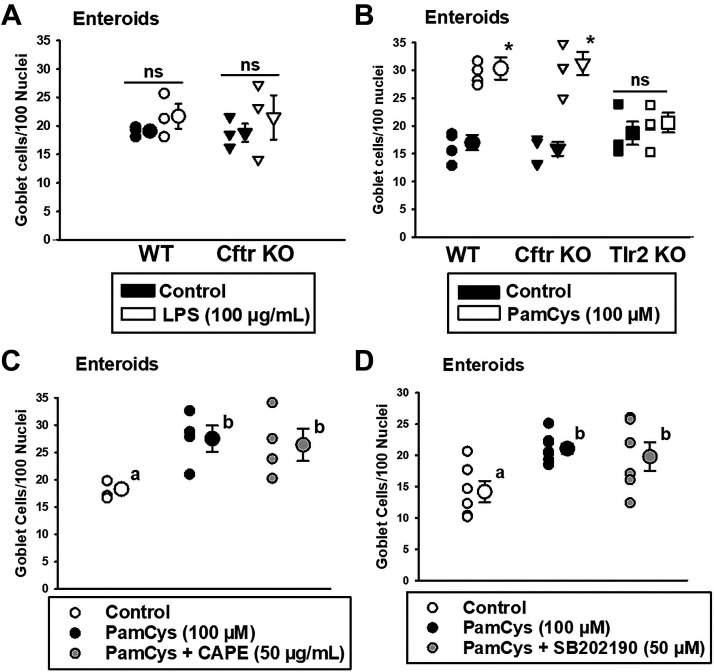Figure 5.
Goblet cell numbers in LPS and Pam3Csk4-treated enteroids from WT and Cftr KO mice. A: Passage 1, 7-day-old WT and Cftr KO small intestinal enteroids that were untreated (control) or treated with LPS (100 µg/mL) for 72 h. Individual data points shown. ns, not significantly different by unpaired t test; n = 3 WT and Cftr KO sex-matched littermate mouse pairs (2 males, 1 female). Average from 4 to 18 enteroids counted per mouse. B: Passage 1, 7-day-old WT, Cftr KO, and Tlr2 KO enteroids that were untreated (control) or treated with Pam3Csk4 (100 µM) for 72 h. Individual data points shown. *Signficantly different from Control by unpaired t test, P < 0.0002 for WT and P < 0.0007 for Cftr KO. n = 4 WT and Cftr KO sex-matched littermate mouse pairs (3 males, 1 female). Average from 5 to 23 enteroids counted per mouse. C: Passage 1, 7-day-old WT that were treated with DMSO vehicle (control) or treated with vehicle + Pam3Csk4 (100 µM) or Pam3Csk4 (100 µM) + CAPE (50 µg/mL) for 72 h. Individual data points shown. a,bMeans with the same letter are not significantly different by one-way ANOVA and Holm–Sidak vs. control comparisons. P = 0.035; n = 4 WT mice (3 males, 1 female). Average from 4 to 22 enteroids counted per mouse. D: Passage 1, 7-day-old WT that were treated with DMSO vehicle (control) or treated with vehicle + Pam3Csk4 (100 µM) or Pam3Csk4 (100 µM) + SB202190 (50 µM) for 72 h. Individual data points shown. a,bMeans with the same letter are not significantly different by one-way ANOVA and Holm–Sidak vs. control comparisons. P = 0.022; n = 4 WT mice (3 males, 1 female). Average from 3 to 11 enteroids counted per mouse. KO, knockout; LPS, lipopolysaccharide; PAS, periodic acid-Schiff; PEG, polyethylene glycol; Tlr, Toll-like receptor; WT, wild-type.

